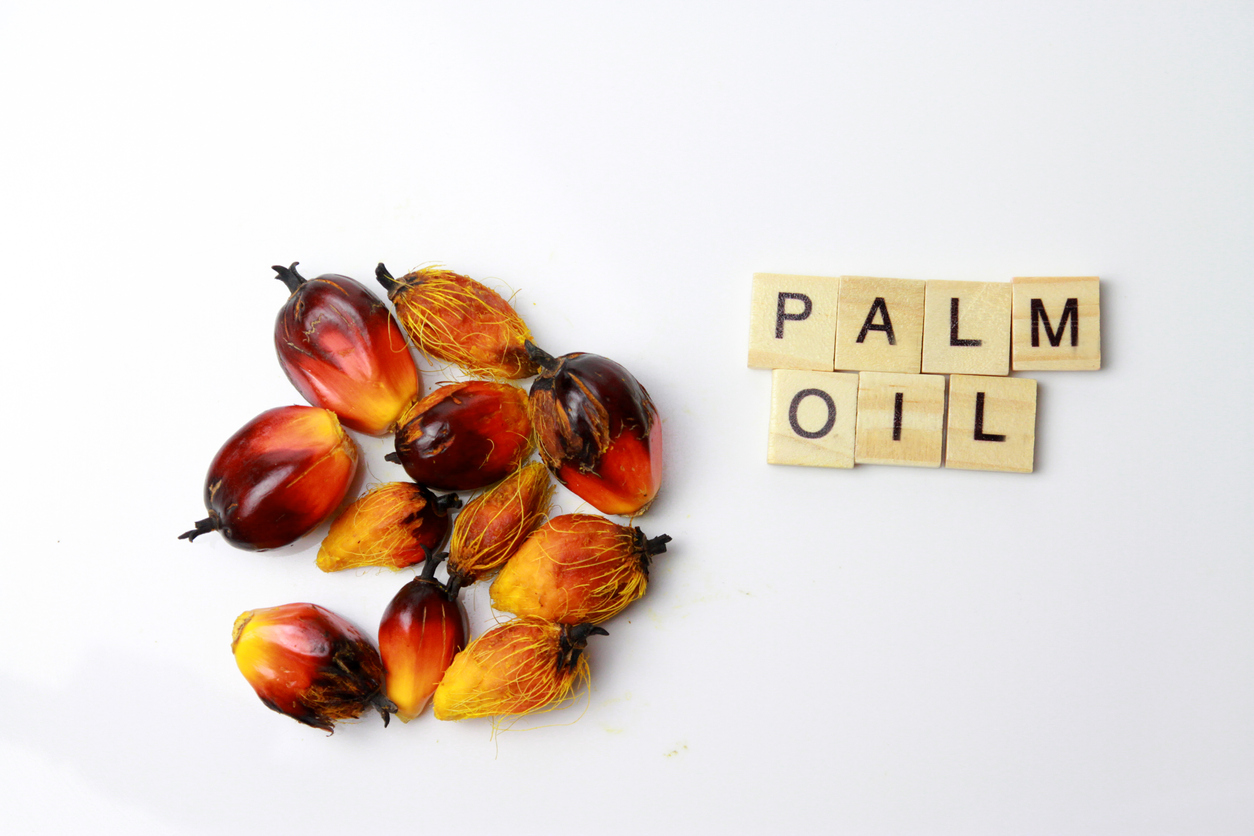This page covers the below sections:
- What are the Alternatives?
- Resources
- How can I use RSPO Certified Palm Oil, Palm Kernel Oil and Derivatives?
- What is the industry doing?
See the Contents for all available Sustainability Hub pages.
 Palm oil and palm kernel oil are natural oils extracted from the fruit of the Elaeis Guineensis (palm) plant. Worldwide annual production of Palm Oil is around 70 million tonnes (2019), with over 20,000,000 hectares covered with plantations (WWF/RSPO). Palm oil is the third largest crop, in terms of planted area, behind soy and rapeseed (Greenfacts).
Palm oil and palm kernel oil are natural oils extracted from the fruit of the Elaeis Guineensis (palm) plant. Worldwide annual production of Palm Oil is around 70 million tonnes (2019), with over 20,000,000 hectares covered with plantations (WWF/RSPO). Palm oil is the third largest crop, in terms of planted area, behind soy and rapeseed (Greenfacts).
In addition to the natural oils extracted from the palm plant (the vast majority of which are used for bio-fuels, food and animal feed), hundreds of ingredients are created by processing and modifying the natural oils and fats. Palm oil is high in palmitic acid whereas palm kernel oil is high in lauric acid, both of which are valued by the food and personal care industries.
Palm oil and its derivatives have become important ingredients in cosmetic and personal care products, due to the trend towards natural ingredients. In terms of global production, the volume of palm oil and palm kernel oil used in our industry is very small.
In recent years concern has been growing about the environmental and social impact of the use of palm oil as a raw material. The drive for such a versatile material has resulted in increasing deforestation, loss of unique habitats and biodiversity and exploitation of communities through issues around land rights, forced labour, poor pay, and poor working conditions. It does however support millions of people, either as workers or as smallholder farmers.
There are benefits to palm oil over other oils. It has the highest yield of all vegetable oil crops per hectare, which means that less land is needed to achieve a similar yield, compared to alternatives. Palm oil production also uses less fertiliser and fewer pesticides (The Sustainable Palm Oil Choice) and stores more carbon than other crops. This means that swapping to other oils would result in more damage to the environment and wildlife (The Sustainable Palm Oil Choise).
Because palm oil is susceptible to oxidisation so needs to be processed within 48 hours after harvest. Palm kernel oil is more stable and is therefore more likely to be stored, shipped, and mixed with other sources of the same material. This hinders traceability, with the transparency of the supply chain potentially compromised as unsustainably sourced oils may be mixed within the .
In 2004 the initiative 'Round Table for Sustainable Palm Oil' (RSPO) was established. Founding members were the WWF, other environmental NGOs, social NGOs, producers, manufacturers, small farmers, traders, retailers, banks, and investors. The aims of the RSPO were to develop new solutions for sustainably harvesting palm oil and preventing the destruction of rain forests, especially in Indonesia and Malaysia.
In 2008 the RSPO developed a set of environmental and social criteria to which companies must comply to produce Certified Sustainable Palm Oil (CSPO). One of the most important criteria within this system is that no primary forests or areas that contain significant concentrations of biodiversity can be cleared. Other principals stipulate a significant reduction of pesticides and fires, fair treatment of workers and the need to inform and consult with local communities before new plantations are developed.
For more information on RPSO’s Principals and Criteria.
The cosmetics industry recognises its responsibility to foster sustainable business practices throughout the supply chain and welcomes the fact that such a complex topic is being discussed with all interested parties in an international dialogue among experts.
Over 20% of the worldwide production of this important agricultural commodity is now produced and certified as sustainable (RSPO). This proportion has grown by voluntary action in just a few years. Yet the challenge facing us all is to increase this further. Whilst the sustainability of palm oil is recognised and embraced in markets across Europe and the United States, further work is required in emerging markets such as China, India and Indonesia.
In terms of global production volumes, the use in cosmetics and personal care products is small; the percentage of total world production of both oils ultimately used is around 2% in cosmetics and 3% in home and personal care products. Around 70% of all cosmetics on the market around the world contain at least one palm derived raw material.
What are the alternatives?
The concern over the focus on palm oil and calls for it to be replaced raise the question of what would that replacement be? It is important that replacements are as sustainable, or even more so.
Palm oil, if produced in a maintainable way, is a highly sustainable vegetable oil. Certified oil is the best social and environmental choice as it protects people, wages and land rights whilst increasing productivity.
Alternative oils providing similar functions and benefits for cosmetic products use significantly more land to obtain the same yield, so substitution by less sustainable oils is not the solution. In terms of contributing the same performance attributes to products, coconut oil and its derivatives are chemically the most similar, yet coconut has less than half the yield of palm.
In addition, demonising palm oil also takes away the incentive to produce more sustainably, to the detriment of the environment and communities involved. The best alternative to palm oil is sustainable palm oil.
One way businesses and consumers around the world will understand the importance of sustainable sourcing of materials is for the messaging to remain factual and consistent; to maintain the market relevance of sustainable palm oil instead of pushing for a boycott or promoting less sustainable alternatives.
Resources
- https://rspo.org/
- https://palmoilalliance.eu/
- https://www.rainforest-alliance.org/tags/palm-oil
- https://palmoilscorecard.panda.org/
- https://www.wto.org/english/news_e/news19_e/envir_15may19_e.htm
- https://www.greenfacts.org/en/oil-palm-biodiversity/index.htm#1
- https://www.cbd.int/
- https://www.sustainablepalmoilchoice.eu/
- https://epthinktank.eu/2018/02/19/palm-oil-economic-and-environmental-impacts/
- https://www.conservation.org/projects/sustainable-palm-oil
- https://www.efeca.com/
How can I use RSPO Certified Palm Oil, Palm Kernel Oil and Derivatives?
To move to using only RSPO certified products in cosmetics and personal care products, companies and suppliers within the supply chain will need to be members of RSPO and participate in their certification system. The type of certification you or your suppliers will need will depend upon the relative positions within the supply chain.
RSPO has set up two certification systems. One is to ensure that palm oil is produced sustainably, this is called “producer/grower certification” or “Principals & Criteria certification”. The other is to ensure the integrity of the trade in sustainable palm oil i.e. that palm oil sold as sustainable palm oil has indeed been produced by certified plantations.
Both systems involve third-party certification bodies.
There are four models within the latter certification system:
- Identity Preserved (IP) – Sustainable palm oil from a single identifiable certified source is kept separately from ordinary palm oil throughout the supply chain
- Segregated (SG) – Sustainable palm oil from different certified sources is kept separate from ordinary palm oil throughout the supply chain.
- Mass Balanced (MB) – Sustainable Palm Oil from certified sources is mixed with ordinary palm oil throughout the supply chain
- RSPO Credits/Book & Claim (BC) – The supply chain is not monitored for the presence of sustainable palm oil. Manufacturers and retailers can buy credits from RSPO-certified growers, crushers and independent smallholders.
More information on the process to obtain RSPO Certification can be found on the RSPO website.
The RSPO have published these documents, which provides full details of the certification systems.
The first stage is to become a member of RSPO, following this companies can become certified. Certification brings with it certain obligations, particularly on reporting of volumes of palm oil, palm kernel oil or derivatives used each year. Reporting takes place directly to the RSPO via an online system. This also means that companies are required to keep detailed records of all the palm oil, palm kernel oil and derivatives that have been used, and the system under which they were produced/obtained.
Certification requires an audit from an RSPO approved Certification Body, a list of these is available on the RSPO website.
RSPO certification processes and procedures would usually form part of a company’s Quality Management System.
Certification allows RSPO members to claim their use of certified palm oil by use of the RSPO trademark, following approval under the RSPO licensing system, on their finished products.
What is the industry doing?
Whilst cosmetic companies use a tiny proportion of the total palm oil production, in comparison to food or biofuel, it is our sector that adds the most value to the ingredient. This is important as it means it is a highly valued commodity. Those companies using certified sustainable palm oil (CSPO) derivatives are paying a significant premium for a high quality, responsibly produced ingredient, rather than opting for cheaper alternatives. This is the cost of managing the ‘chain of custody’ required for certification.
CTPA is encouraging all members to move to using CSPO and palm oil or palm kernel oil derivatives that are made from CSPO. Our industry must recognise its responsibility to foster sustainable business practices throughout the supply chain and we welcome the fact that such a complex topic is under the spotlight.
The initiative ‘Round Table for Sustainable Palm Oil’ (RSPO) works to increase the number of growers and material certified as sustainably harvested by improving conditions, developing new methods and preventing the destruction of rain forests especially in Indonesia and Malaysia.
Companies that use the RSPO Trademark raise awareness of the issues. They can help raise the awareness of them and inform their consumers about the role they can play in protecting the environment and improving social outcomes throughout the ingredient supply chains.
The cosmetics industry is also constantly investigating sustainable alternatives, considering all aspects of the ingredient’s lifecycle including yield, versatility, harvesting and production requirements and the environmental fate once a product is used. Future options may include other naturally sourced or synthetic materials and/or optimising the yield of palm by development of modern agricultural techniques.
What can the consumer do?
The cosmetic and personal care industry is ideally positioned to promote to its consumers the benefits of using products manufactured using sustainably and responsibly resourced ingredients. Members may wish to promote their use of RSPO certified ingredients to encourage consumers to consider this important topic and highlight how buying reputable products can prevent deforestation and protect worker’s rights around the world.
By promoting how they use sustainable ingredients, members can help educate their consumers and raise the overall awareness of the issues around palm oil, palm kernel oil and their derivatives, showing that the best alternative to palm based ingredients are responsibly sourced palm based ingredients.
By doing this, members will help consumers understand what is in their products and give them a wider perspective on the use of palm products not just in the cosmetic and personal care industry but in a wider context. CTPA is committed to helping consumers understand what is in the products that they use and to trust whether the ingredients used within them are from sustainable sources.
Greater use of the RSPO logo on products should help increase general awareness and levels of understanding, particularly on how to identify palm-based ingredients used in products. This can also be used to encourage consumers to use their products more responsibly.
